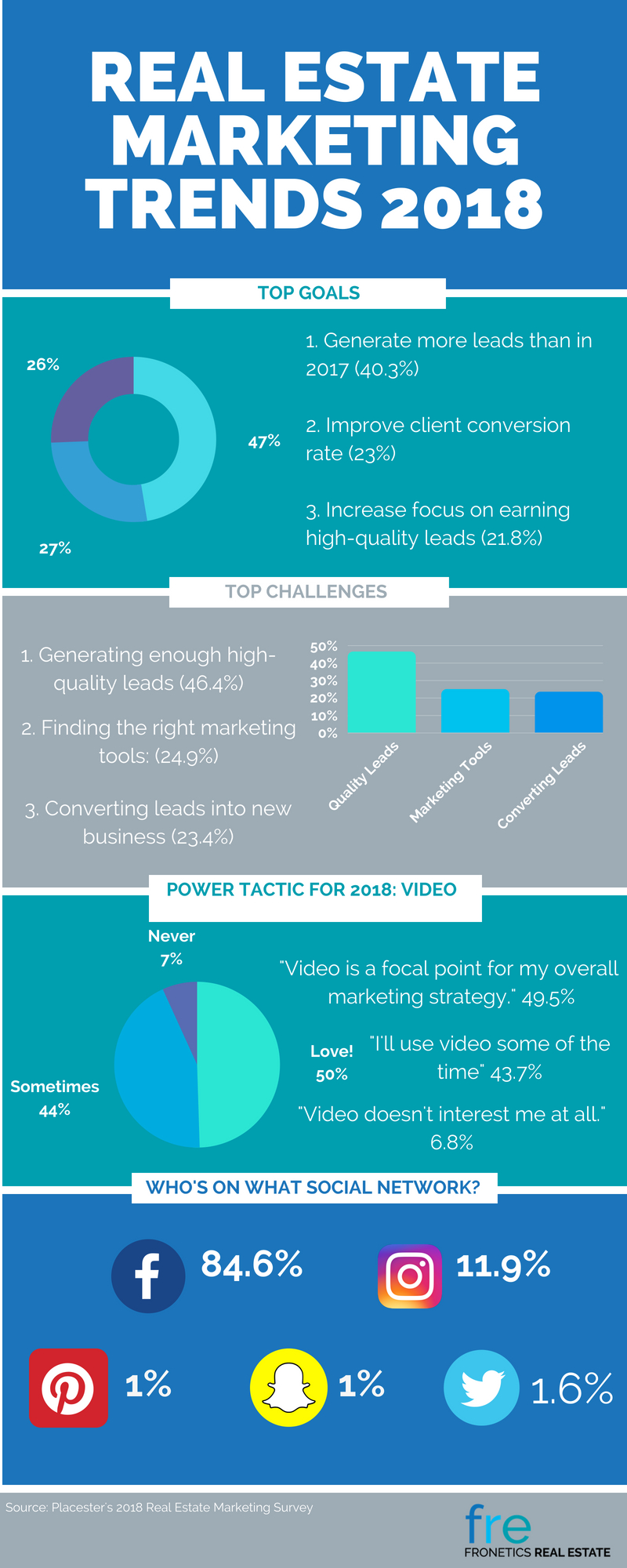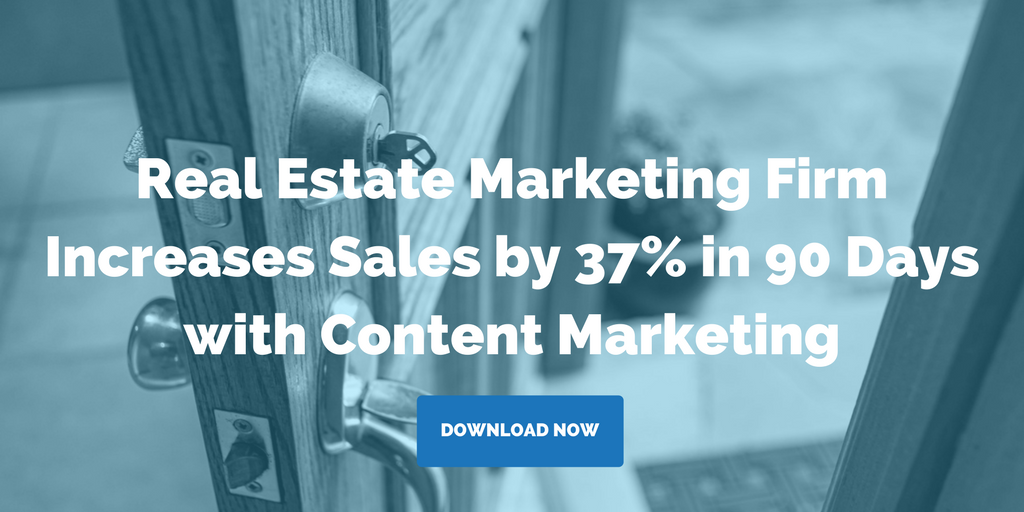Posts Tagged "lead generation"

Infographic: Real Estate Marketing Trends 2018
Placester’s 2018 Real Estate Marketing Survey reveals these real estate marketing trends: lead generation, challenges, the rise of video content, and social media.
Earlier this year, digital marketing platform Placester published the results of its 2018 Real Estate Marketing Survey. The survey collected data from hundreds of real estate professionals nationwide and contains valuable information for benchmarking your marketing efforts, in “an industry ready to invest more time, money, and energy toward online marketing and generating more leads.”
When we looked at the survey results, we found that there were four big takeaways for real estate marketing professionals: goals, challenges, the rise of video content, and social media. Our infographic below delves into each of these four key areas.
Why are these results significant for me?
First off, you can learn a lot from looking at the aggregate goals for the real estate industry. Understanding what peers are working toward can help you tailor your own efforts, prune unnecessary practices, and optimize your marketing efforts. Knowing, for example, that 40.3% of survey respondents cited lead generation as a top objective helps you get to the bottom line: Regardless of experience, skill level, or niche, real estate professionals are focused on attracting valuable clients, and you should be, too.
Likewise, having an understanding of industry-wide challenges can offer valuable insight. Placester’s survey reveals that just as lead generation is a top priority for the majority of respondents, it’s also the top concern for real estate professionals.
As far as techniques go, one of the most popular marketing tactics for greater exposure in 2018 is emerging as video. The survey reveals that the real estate industry is embracing the power of video marketing. And the good news is, you don’t need an expensive camera, lighting, or a production studio. Your smartphone can be just as effective for creating video content for your social media outlets.
Which brings us to social media. A whopping 84.6% of respondents pointed to Facebook as the social media network they will use the most in 2018. And for good reason. Facebook is ideal for real estate marketing in many ways. Its large user base makes it a go-to network, as well as its robust mobile presence, with location-specific advertising and sophisticated algorithms to help you reach your target audience.
Check out our infographic below for a summary of the rest of Placester’s data.
Real estate marketing trends 2018 infographic
Related posts:
- A Visual Guide to Social Media Posting Frequency for Real Estate
- 10 Social Media Statistics for Real Estate Marketers 2018
- 5 TED Talks for Real Estate Marketers
Posts Tagged "lead generation"

4 Real Estate Marketing Trends 2018
These 4 takeaways from Placester’s 2018 Real Estate Marketing Survey give us an idea of real estate marketing trends to keep an eye on.
Digital marketing platform Placester recently published the results of its 2018 Real Estate Marketing Survey. The survey, which collected data from hundreds of real estate professionals nationwide, contains valuable information for benchmarking your marketing efforts in “an industry ready to invest more time, money, and energy toward online marketing and generating more leads.”
We’ve pulled out the top 4 takeaways from the survey here. Interestingly, these real estate marketing trends align with those we are seeing with our clients as well.
In general, real estate marketers are focused on leads: acquiring valid potential buyers and then turning them into sales. It makes sense, then, that many are turning to content marketing as a strategy, as it can be a highly effective lead-generation engine. Read on for more.
4 real estate marketing trends to watch
1) A focus on lead generation, nurturing, and conversion.
You can learn a lot from looking at the aggregate goals for the industry.
When asked about their top objective for 2018, 40.3% of survey respondents name generating more new leads than in 2017. Additionally, 23% look to improve on last year’s client conversion rate, 21.8% cited focus on the quality of leads earned, and 14.9% are aiming to learn how to better nurture and qualify prospects.
The bottom line: real estate professionals are focusing on generating, nurturing, and converting leads.
2) Challenges
As with looking at objectives, having an understanding of industry-wide challenges also offers valuable insight.
46.4% of survey respondents said that generating enough high-quality leads is the biggest marketing challenge they face in 2018. Rounding out the list, 24.9% are concerned about finding the right marketing tools to use; 23.4% cite converting leads into new business; and 5.3% are worried about analyzing their marketing performance.
Just as lead generation is a top priority for the majority of respondents, it’s also the top concern for real estate professionals.
3) Video
One of the most popular marketing tactics for greater exposure in 2018 is video.
When asked what part video will play in overall marketing strategy, 49.5% of respondents indicated that it would be a focal point. 43.7% said they would use it some of the time, while only 6.8% indicated that video didn’t interest them at all.
The real estate industry is embracing the power of video marketing. And the good news is, you don’t need expensive camera, lighting, or a production studio — your smartphone can be just as effective for creating video content for your social media outlets.
4) Social media
Which brings us to social media.
When asked which social media network they will use most, a whopping 84.6% of respondents pointed to Facebook, with 11.9% saying Instagram, 1.6% saying Twitter, and 1% respectively for Pinterest and Snapchat.
Facebook is ideal for real estate marketing in many ways. Its large user base makes it a go-to network, as well as its robust mobile presence, with location-specific advertising and sophisticated algorithms to help you reach your target audience.
What real estate marketing trends are you keeping an eye on this year?
Related posts:
- 5 Marketing Automation Ideas for Real Estate
- Social Media Trends for 2018 Real Estate Marketers Need to Know
- Social Media Can Be a Strategic Weapon in Real Estate Marketing
Posts Tagged "lead generation"

7 Ways Content Marketing Helps Sell Luxury Real Estate
Do you sell luxury real estate? Are you using content marketing? Here are 7 reasons you should.
It’s no secret that, when it comes to driving luxury real estate sales, content marketing works. According to Placester’s 2018 Real Estate Marketing Strategy Survey Report, 42.1% of real estate professionals surveyed plan to experiment with developing new types of content they haven’t tried. And a whopping 94.1% plan to focus on creating new and unique content for their websites.
So how exactly does content marketing help you sell luxury real estate? Here are 7 ways, just to name a few.
7 ways content marketing helps sell luxury real estate
1) Connect with qualified buyers.
Luxury buyers are highly likely to do purchasing research online. A robust digital and social media presence creates a virtual touch point to connect with affluent buyers.
2) Broaden brand awareness.
According to Sprout Social’s Consumer Engagement Index, which ranks industries by engagement from customers on social media, the real estate industry is second overall in terms of inbound engagement relative to audience size. As hyper-connected buyers engage with your relevant, quality content online, they share with their networks, and your content starts working for you exponentially.
3) Drive traffic to your property website.
Since 93% of all online experiences begin with a search engine, and 75% of searchers don’t click beyond the first page of search results, SEO is crucial for driving traffic to your property’s page. As search engine algorithms evolve, quality content is more and more important in making sure buyers find your property among top results.
4) Communicate real-time updates to potential buyers.
Through social media, particularly through the use of video content or live stories, you can get real-time updates to luxury buyers about project timelines, availability, construction progress, neighborhood news, and promotions.
5) Generate leads.
Content marketing helps drive qualified buyers to your site. According to a spokesperson for New York City-based Corcoran Real Estate Group, since adopting a robust content marketing strategy, “the quality of the referral traffic back into our main website has significantly improved. And not only are we seeing more traffic coming in, but visitors coming in from social media sites are staying longer and looking at more things.”
6) Nurture leads.
Content marketing — particularly a well-planned, automated email strategy — is a highly efficient and effective way to develop relationships with buyers at every stage of the sales process. HubSpot recently reported that businesses using marketing automation to nurture leads received a 451% increase in qualified leads. That’s right: 451%.
7) Sell your neighborhood.
Blog content focused on neighborhood amenities, seasonal recreational activities, area restaurants, etc. can help highlight factors that make your properties attractive to affluent buyers.
As Fronetics’ Director of Strategy Jennifer Hart Yim writes, “Content marketing is a new approach to an old strategy — one that’s putting real estate marketers in charge of the way potential buyers interact with their properties.”
Do you use content marketing to sell luxury real estate?
Related posts:
- 4 Ways a Blog Can Help You Sell Real Estate
- Social Media Trends for 2018 Real Estate Marketers Need to Know
- What Metrics Should You Track in Real Estate Marketing?
Posts Tagged "lead generation"

5 Marketing Automation Ideas for Real Estate
Real estate marketers using marketing automation can save time and money while increasing leads, conversions, and overall marketing success.
One of the biggest marketing trends this year is automation. HubSpot recently reported that businesses using marketing automation to nurture leads received a whopping 451% increase in qualified leads. So how can real estate marketing professionals reap these benefits while saving time and money on their efforts?
If you’re using it right, marketing automation software can deliver real-time, personalized messages to prospective buyers and renters at every step of the lead-generation process. You can tailor custom email messages based on indicated interests, streamline social media efforts with scheduled posts, evaluate the success of your efforts, and adjust your strategy accordingly.
Check out these five ways that marketing automation can help you sell real estate, with suggested tools for each idea.
5 marketing automation ideas for real estate
1) Social media
Keeping your posts on multiple platforms up to date, consistent, and engaging can be a major time drain. Automating your social media marketing efforts lets you plan ahead and schedule updates on some or all of your social media channels, and lets you easily strategize about peak posting times.
Suggested tool: Sprout Social
2) Email
Having a segmented email list — sorted by when someone joined the list, what emails they’ve opened, their demographics, etc. — is key. This way, you can ensure you’re sending the most relevant information to your prospects, keeping them invested (and keeping you out of their spam folder). Once you set up a template, plugging in your content is easy. You’re able to manage your contact list and schedule emails in advance.
Suggested tool: MailChimp
3) Text messages
There’s a good chance you’re reading this on your cell phone, and, if not, it’s probably close by. Savvy marketers are taking advantage of the ubiquitous nature of mobile devices and using texting to reach audiences with a short message that they’re highly likely to read.
Suggested tool: TextMarks
4) Direct mail
While any number of virtual marketing platforms are beneficial, direct mail is still a powerful tool for real estate. It can be highly time-consuming to manage direct mail campaigns and mailing lists, but automation software that lets you generate geographically or demographically targeted mailing lists can help you reach your ideal audience.
Suggested tool: TriggerMarketing
5) Lead generation and nurturing
Converting website visitors to leads is always the goal, but it often comes with a back-breaking load of time-consuming labor. The right software lets you move your prospect through the sales funnel automatically, sending emails to educate them on the next steps, and scheduling them for viewings.
Suggested tool: SmartZip
What marketing automation tools are you using in your real estate marketing?
Related posts:
- What Metrics Should You Track in Real Estate Marketing?
- Social Media Can Be a Strategic Weapon in Real Estate Marketing
- When Traditional Real Estate Marketing Methods Stop Working, Try Digital Marketing
Posts Tagged "lead generation"

Facebook Lead Ads: Why Your Property Should Use Them
Facebook Lead Ads allow prospects to leave their contact information without ever leaving Facebook or Instagram, increasing the chances of conversion.
On pace to hit 2 billion users this year, Facebook obviously has reach. Yet only 45% of B2C marketers feel that their Facebook marketing efforts are working. So why is Facebook advertising not showing a greater ROI for your business?
Well, what kind of ads are you running? Are you using lead ads? If not, that’s probably one of the reasons.
How Facebook Lead Ads work
Facebook lead ads allow you to run lead-generation campaigns on Facebook and Instagram. This kind of social advertising shows an ad for your property within the newsfeeds of potential buyers and renters. Just set the parameters (e.g. demographics, location, etc.) for your target audience, and the network’s algorithm will identify who sees the ad based on information they’ve provided in their profiles.
But here’s the real kicker: Unlike other ad types, lead ads include a contact form that lets prospects show their interest by filling out the form with their details without ever leaving Facebook (or Instagram).
Need more convincing? Here at Fronetics Real Estate, we find Facebook Lead Ads one of the most effective for generating leads. Because they streamline the process through which prospects sign up to learn more about your property, it’s more likely they’ll convert to leads. Besides, you save time and money because you don’t have to create extra landing pages to get their contact information.
Lead generation made easy
These days, people expect that everything from shopping to job searching can be done on their handheld devices. Facebook Lead Ads make that true for people wanting to learn more about potential properties.
Here’s how it works: Prospects click on a lead ad, and their contact information automatically populates based on information from their profile. No leaving Facebook to visit the property’s website or taking the time to provide contact information necessary. Lead ads make submitting information as easy as two taps on a phone: one to open the ad, and one to submit the information.
“If you want to iterate through lead forms quickly, Facebook Lead Ads are a great way to collect the information without building new landing pages and creating tons of copy,” says Tony Adams in Visible Factors. “The contact forms appear natively on Facebook and Instagram. You can easily use them to sign people up to newsletters for drip marketing campaigns.”
In a prime success story, news and information site theSkimm wanted to expand its reach and increase its conversion rate, with the ultimate goal of attracting more highly qualified leads and significantly increasing its subscriber pool. After testing a number of different tactics, theSkimm created a series of Facebook Lead Ads. The ads featured the company logo to reinforce its branding and a ‘Subscribe’ link inviting people to sign up on the spot. The result was a 22% increase in lead quality at a cost per acquisition of just $1-2.
Creating and modifying your ads
As buyers continue to turn to their handheld devices for quick, easy information, Facebook lead ads will give your property the opportunity to capture new leads with the click of a button. But just like any form of lead generation, you need to monitor and tweak your Facebook Lead Ads for optimal results.
Through Facebook’s Ads Manager reporting interface, you can obtain reports about cost, impressions, and clicks. As with all marketing tools, consistent refinement is the key to success, particularly in real estate marketing. Lead ads can easily be fine-tuned to cultivate a larger target audience.
Facebook Lead Ads provide real estate businesses an opportunity to gain leads and a larger reach. If you haven’t tried this yet, we highly recommend switching over some of your social advertising budget.
Related posts:




